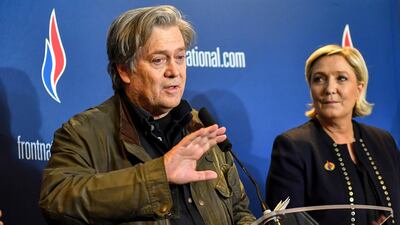Steve Bannon, the former White House chief strategist, has told France’s far-right Front National party that “history is on our side and will bring us victory”.
In an address at the party’s annual conference in Lille on Saturday, Mr Bannon, who played a pivotal role in Donald Trump’s campaign for the US presidency, told the crowd: “You are part of a movement that is bigger than that in Italy, bigger than in Poland, bigger than in Hungary.
“You recall the evening of the American election; the traditional media were shocked. They could never have believed that the Americans had finally voted in their own interests.
“You fight for your country and they call you racist. But the days when those kind of insults work is over. The establishment media are the dogs of the system. Every day, we become stronger and they become weaker. Let them call you racists, xenophobes or whatever else, wear these like a medal."
Mr Bannon’s surprise appearance in Nice came as Front National leader Marine Le Pen attempts to reinvent the party, following a poor showing in last year’s parliamentary election.
The conference also voted on an official renaming of the party to Rassemblement National – National Union. It also severed ties with founder Jean Marie Le Pen – Ms Le Pen's father, who led led the party until 2011. He was expelled by his own daughter in 2015 but remained linked to the party through the symbolic position of honorary chairman, a post that was officially abolished on Sunday.
Philippe Marliere, professor of French politics at University College London, suggested Mr Bannon’s appearance was at odds with Ms Le Pen’s efforts to rebrand the party. “It’s a bit of a surprise, it seems to be going against Marine Le Pen’s new strategy of being more inclusive. She has said she doesn’t want it to be seen as a far-right party, and she’s serious about getting into power. For that you need to be seen as more inclusive, you need to branch out.
"The strategy is inconsistent. If she really wants to go beyond the usual 15 per cent to 20 per cent – the glass ceiling – you need to be seen as a less extreme. Inviting Bannon is a contradiction. He's not a moderate conservative figure – on the contrary, he's associated with neo-Nazis and racists. Even on the right in France there was not much support for Trump," Mr Marliere told The National.
“There is a contradiction between the effort to rebrand and reach out to others and the reality on the ground; it is still a far-right, extremist party.”
____________
Read more: Far-right group should repay €427,000, as per EU Parliament
____________
Mr Bannon, the former head of Breitbart News, had an acrimonious departure from the White House last August, and a public spat with Mr Trump ensued.
A speaking tour last week saw him make appearances in Italy, where he hailed the victory of populist parties in the March 4 election as an “earthquake”. He also made appearances in Switzerland and Germany, where he met with members of the far-right Afd party.
In an interview with The New York Times last week, he said was focusing his efforts on spurring a populist uprising outside of the United States. "All I'm trying to be is the infrastructure, globally, for the global populist movement," he said.
He said he was considering buying a news outlet such as Newsweek to provide his populist message with a voice. "There are going to be these populist nationalist news sites that pop up in the next year online. That will only take these things to the next level."
Christophe Castaner, head of President Emmanuel Macron’s En Marche! party, was critical of Mr Bannon's appearance. "The king of fake news and of white supremacists at an FN summit … why am I not surprised? Change of name but not of the political line."
But Ms Le Pen defended Mr Bannon’s invitation, saying it was important the party heard from "the architect of Donald Trump's victory".
Benjamin Haddad, a fellow at the Hudson Institute, suggested Mr Bannon’s speech was largely an effort to capitalise on the publicity he could generate. “I don't think it fits with [Ms Le Pen’s] strategy of rebranding. I think this was mostly a publicity stunt linked to her attempt to ride on Trump's victory in the context of her own electoral defeat and embattled position. She's very contested, and has had a hard time emerging as the opposition to Macron.
“She has tried to change the front of the party, [to] focus on economics and the EU, [and to] be seen more as populist than far right. Interestingly, during the US campaign, she distanced herself from Trump, notably when he talked of the Muslim ban, but after his victory, she completely changed gear and tried to embrace his victory. So I see the Bannon invitation in this context,” Mr Haddad said.


